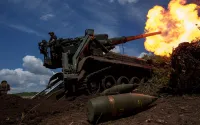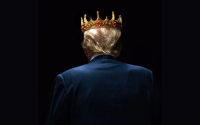A year on from 'Mission Accomplished', an army in disgrace, a policy in tatters and the real prospect of defeat
2 May 2004The Independent
Wisps of grey smoke were still rising from the wreckage of four Humvees caught by the blast of a bomb which had just killed two US soldiers and wounded another five. It seemed they had been caught in a trap.
When the soldiers smashed their way into an old brick house in the Waziriya district of Baghdad last week, they were raiding what they had been told was an insurgent bomb factory, only for it to erupt as they came through the door. The reaction of local people, as soon as the surviving American soldiers had departed, was to start a spontaneous street party.
A small boy climbed on top of a blackened and smouldering Humvee and triumphantly waved a white flag with an Islamic slogan hastily written on it. Some other young men were showing with fascinated pride a blood-soaked US uniform. Another group had found an abandoned military helmet, and had derisively placed it on the head of an elderly carthorse.
A year after President George Bush famously declared "major combat" in Iraq over, how is it that so many Iraqis now have such a visceral hatred of Americans? One reason is that the photographs of brutality and humiliation of Iraqi detainees by British and American troops, which have so shocked the rest of the world and angered Arab countries, have come as little surprise to Iraqis. For months it has been clear to them that the occupation is very brutal; for weeks they have been watching pictures of the dead and injured in Fallujah on al-Jazeera satellite television which CNN did not broadcast.
Iraqis, who are cynical about their rulers, may also suspect that real as well as simulated torture is going on in Abu Ghraib prison, where US intelligence calls the shots. They may suspect that, as under Saddam Hussein, the humiliation and ill-treatment were quite deliberately inflicted to soften up prisoners before they were interrogated. More graphic pictures of real torture are said to have been taken as well those shown on US television last week.
Saddam should not have been a hard act to follow. Iraqis knew that he had ruined their lives through his disastrous wars against Iran and Kuwait, and were glad to be rid of him. Even the supposed beneficiaries of his rule, the Sunni Arabs of cities such as Tikrit and Fallujah, could not see why they were so much poorer than the people of other oil states such as Kuwait and Abu Dhabi.
Watching the dancing, jeering crowd in Waziriya was Nada Abdullah Aboud, a middle-aged woman, dressed in black. She had a reason for hating Americans, though she claimed she did not do so. "I do feel sorry for the young soldiers, though they killed my son," she said quietly. "They came such a long distance to die here." It turned out that her son, Saad Mohammed, had been the translator for a senior Italian diplomat working for the ruling Coalition Provisional Authority. She said: "My son was driving with the Italian ambassador last September near Tikrit when an American soldier fired at the car and shot him through the heart."
Saad Mohammed was one of a large but unknown number of Iraqis shot down by US troops over the past year. There seems to have been no rational reason why he had been killed. But the high toll of Iraqi civilians shot down after ambushes or at checkpoints has given Iraqis the sense that, at bottom, American soldiers regard them as an inferior people whose lives are not worth very much.
Iraqis make very plain what they think about the occupation in private conversation, but Paul Bremer, the US viceroy in Iraq, and the US military command, shut away in their headquarters in Saddam's old Republican Palace, had no idea of the growing hostility towards them until April. Then, when they started the sieges of Fallujah and Najaf, they discovered that aside from the Kurdish minority, Iraqis had turned decisively against the occupation.
Another simple reason for disillusionment with the US is simply the Americans' failure to restore normal life. Iraqis in Baghdad continually say that Iraq recovered more quickly from the damage inflicted by the first Gulf War under Saddam in 1991 than it did after the second war in 2003.
Baghdad is a city on edge. Shopkeepers keep their stock at home in case there is another outbreak of looting. The police are back on the streets and there is less casual crime than last year, but it is still more dangerous than it was under the old regime.
Abu Amir, a shopkeeper in the middle-class Jadriyah district of the capital, said: "Under Saddam I sometimes did not make money in my store, but I could go home in the evening without worrying if my son had got back safely. Now there is looting everywhere. If you walk in the streets maybe you will be shot by the Americans or by criminal gangs fighting each other."
A curious achievement of the US over the past year has been to revive Iraqi nationalism in Iraq. This had been largely discredited by Saddam. But Fallujah and the pursuit of Muqtada al-Sadr, the radical Shia cleric, has meant that nationalism is once more respectable.
The extraordinary political weakness of the US in Iraq became evident as never before last week. Despite having an overwhelming military force available to take Fallujah and Najaf, the US did not dare do so. It had become evident even in Washington that to crush the resistance in either city - not a difficult task against a few thousand lightly armed gunmen - would spread rather than end the rebellion.
Even so, it was extraordinary to see Jassim Mohammed Saleh, a general in Saddam's Republican Guard - disbanded like so much else in Iraq last May - being driven into Fallujah on Friday in full uniform past cheering crowds. The old Iraqi flag, now dropped by the US-appointed Iraqi Governing Council, was being waved from his car window.
It is a measure of how far the Governing Council is out of touch with ordinary Iraqi opinion that they should have voted to change the flag in the first place. Mohammed, an engineer trying to patch up a broken sewage pipe in Baghdad, still had time to express his fury at the change. "Of course the occupation is a disaster," he said. "We understand the Governing Council are American agents. But a man has to be the worst of collaborators to change his country's flag."
On 30 June the US will be handing over very little to Iraqis. Security remains firmly in US hands; so does control of money. One of the biggest US mistakes was not to hold elections earlier, something British and US officials admit in private could have been done. This would have produced a legitimate Iraqi authority to which Iraqi security forces could have given real loyalty. Dr Mahmoud Othman, a member of the Governing Council, says: "Iraqis are never going to fight other Iraqis under the orders of an American." This was amply borne out when half of the US-trained security forces deserted or mutinied in early April.
The tide is going out for the US in Iraq. They were not able to use their military strength against Fallujah and Najaf. They have very little political support outside Kurdistan. They can no longer win. It may be one of the most extraordinary defeats in history.






